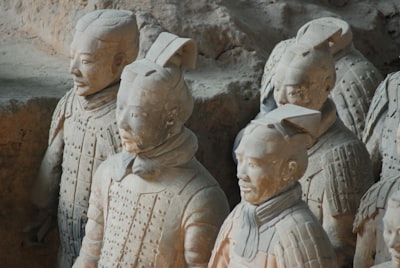Understanding China's WWII Narrative and Its Modern-Day Implications
The way China commemorates World War II has become more than a history lesson—it's a carefully curated narrative that shapes national identity, geopolitical strategy, and even everyday interactions between nations. As the 80th anniversary of China’s victory over Japanese forces approaches, events like museum exhibitions and grand military parades bring underlying political motives and social consequences into sharp focus. In this article, we delve into the multilayered politics of China’s WWII memory, its impact on Sino-Japanese relations, and what this means for China's geopolitical positioning today.
Keywords at a Glance
- China WWII narrative
- Chinese patriotism and nationalism
- Sino-Japanese relations
- Historical trauma in China
- China’s rise and US-China competition
- WWII museums in China
- South China Sea tensions
- Century of humiliation
- Communist Party legitimacy
How World War II Narratives Shape Patriotism and National Identity in China
China’s remembrance of WWII is not just about honoring the past—it's an active tool in nation-building. Museum displays, government statements, and education curricula all emphasize themes of patriotism, peace commitment, and a deep-seated opposition to Japanese militarism. These themes are woven into the broader narrative of China’s 'century of humiliation' and subsequent rise, fostering a collective memory that empowers Chinese citizens to 'never forget and never again.'
Why is China’s WWII remembrance so powerful today?
- It strengthens a shared sense of sacrifice and resistance, especially among the youth.
- It reaffirms loyalty to the Communist Party of China (CPC), positioning the party as the ultimate defender of national sovereignty.
- It generates emotional unity, but can also polarize attitudes, particularly towards Japan.
The Complex Legacy of Anti-Japanese Sentiment
A key aspect of China's WWII narrative is the open remembrance of atrocities committed by Japanese forces, such as the Nanjing Massacre and occupation-era violence. While this historical trauma is undeniable, it sometimes risks fueling broader anti-Japanese sentiment that affects present-day relations.
Recent Trends in Sino-Japanese Tensions
- Spike in hate crimes: High-profile attacks against Japanese residents in China raise concerns over the transformation of anti-militarism into ethnic hostility.
- Education and censorship: Chinese media and museums graphically depict wartime atrocities, while also regulating content to suppress extreme nationalism.
- Diplomatic unease: Japanese government actions, such as official shrine visits or textbook revisions, often spark renewed outcry in China.
Peace and Power: Is China’s Pacifist Image Convincing?
China brands itself as a champion of peace, particularly through slogans like "Cherishing peace and creating a better future." Yet, this message finds mixed reception abroad due to:
- Territorial disputes in the South China Sea with countries like Vietnam and the Philippines.
- Heightened military posture near Taiwan and the Diaoyu/Senkaku islands.
- Support for Russia amid the Ukraine war, casting doubt on its neutrality for some international observers.
Still, much of the developing world views China’s peaceful rise narrative as authentic, especially in contrast to Western colonial legacies and ongoing conflicts elsewhere.
The Role of the Communist Party in Shaping Historical Memory
China’s ruling party stakes much of its legitimacy on its role in resisting Japanese aggression and ending the country’s 'century of humiliation.' Military victories led by Communist forces are emphasized over those from the Kuomintang (despite historical debates about their comparative contributions). This selective memory:
- Reinforces the CPC’s image as the protector of Chinese interests.
- Fosters national unity at politically pivotal moments.
- Marginalizes alternative viewpoints and contributions by non-Communist actors during WWII.
Lessons from the Past: WWII and the US-China Power Struggle
Today, China's WWII narrative is not just about Japan—it also doubles as a lens through which to frame the contemporary rivalry with the United States. As trade wars, technological restrictions, and geopolitical maneuvering intensify, Chinese commentators frequently recall the lessons of weakness and humiliation from history, forging national resilience through calls for strength and unity.
Key Takeaways:
- China’s WWII commemoration is both a memorial and a political instrument.
- The narrative influences international perceptions, regional security, and domestic politics.
- A balance is needed between remembering historical trauma and preventing new cycles of animosity.
FAQ: China’s WWII Narrative & Geopolitics
1. Why does China emphasize its resistance to Japan in WWII? China views this chapter as a cornerstone of its national identity and the foundation for Communist Party legitimacy.
2. How does China’s portrayal of WWII affect current Japanese-Chinese relations? It often generates tension, especially when wartime memory is politicized or leads to public hostility.
3. Is China’s commitment to peace questioned abroad? Yes, particularly given territorial disputes and military activities, though many in the Global South see China as a stable, non-aggressive power.
4. What are the most visited WWII sites in China? Key locations include the Museum of the War of Chinese People’s Resistance against Japanese Aggression (Beijing), Nanjing Massacre Memorial Hall (Nanjing), and the Shanxi war museum.
Further Reading
- Carnegie Endowment – The Power of Memory in Sino-Japanese Relations
- Asia Society – National Identity and the Legacy of WWII in East Asia
Conclusion: The Enduring Power of History
China’s WWII narrative, with its potent mix of pain, pride, and aspirations for peace, continues to reverberate across the Asia-Pacific. As the 80th anniversary marks another round of reflection and spectacle, one thing is clear: history is not only a record of the past, but a powerful force shaping the future of China and its place on the world stage.

Comments
No comments yet. Be the first to comment!